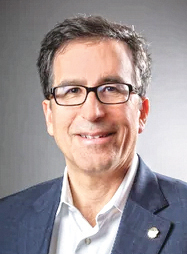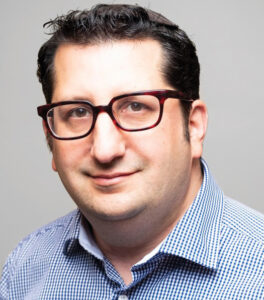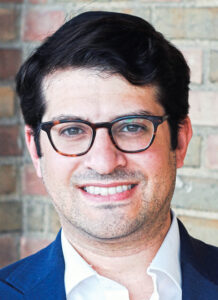Hillel Academy: Ohio voucher expansion a ‘big win for students’

Day school anticipates increased enrollment, stronger footing
By Marshall Weiss, The Dayton Jewish Observer
With a significantly expanded EdChoice Scholarship student voucher program as part of Ohio’s 2024-25 two-year budget, all families in the state are eligible to receive vouchers toward kindergarten through 12th-grade private school tuition beginning with the coming 2023-24 school year, which starts in a few weeks. That’s because Ohio’s fiscal year began on July 1.
Ohio families with an annual income up to 450 percent of the federal poverty level are now eligible for $6,165 per child for kindergarten through eighth-grade private school tuition, and $8,407 for ninth through 12th grades.
A family of four with an annual income of $135,000, for example, is at 450 percent of the poverty level.

“It’s a great change,” says Hillel Academy of Greater Dayton Interim Principal Anna Smith. “And not just for Hillel. For students, it’s a great win.”
Hillel is the Dayton area’s Jewish day school, open to Jewish children from kindergarten through sixth grade. Its 2023-24 school year begins Aug. 16.
Families above 450 percent of the federal poverty level will receive scholarship funding tiered at lower levels, but at a minimum are eligible for 10 percent of the total amounts.
Hillel’s full tuition for the 2023-24 school year is $10,000.
“It’s a very significant help for families,” Smith adds. “Hillel’s already a great value, but being able to have the assistance of over 60 percent of the tuition is pretty generous.
“There are some families that automatically rule out private school because of tuition. And having that voucher that expands accessibility, I think, will make them more open to it. It will help students achieve the private-school education that they haven’t yet had.”
Hillel Academy President Andy Schwartz says that Hillel’s longstanding policy is never to turn away a child because of a family’s inability to pay.
“We do have scholarship money coming in,” he says. “But sometimes we have to go back to the donors to have them increase their amount to cover the gap.”
Smith says more than half of Hillel students currently receive financial scholarships from the school.
Schwartz added that the expanded EdChoice vouchers “will potentially provide additional funds to support the school and make it easier to meet any budgetary gaps that arise.”

Located on the third floor of Beth Abraham Synagogue at Sugar Camp in Oakwood, Hillel Academy is able to accommodate 50 students in total each school year.
For the 2023-24 school year, 32 students are currently enrolled.
“We are still taking admissions for all grades,” Smith says. “We’re open to Jewish students in K to six. We look at transcripts and testing and make sure we can accommodate students’ needs.”
Schwartz notes that because of the small size of the school, “it is difficult for us to accommodate children with special needs. We don’t have the resources.”
Smith says children must be accepted to a private school before the state will award the vouchers.
“Parents will contact us. They could technically apply for the vouchers by themselves, but nothing’s going to happen until I put them into the system. Once the application opens up, we’ll send it out to all of our families if they would like to apply for it.”
State’s tax-deduction program also benefits Hillel
Hillel Academy has also started leveraging a state program approved with Ohio’s 2022-23 budget, Every Child Every Family, a scholarship granting organization in which donors in Ohio may designate the private school of their choice to receive donations of up to $750 for an individual or $1,500 married/filed jointly and receive the full amount as a state tax credit.
Howie Beigelman, president and CEO of Ohio Jewish Communities — the lobbying arm of Ohio’s eight Jewish Federations — says the state has expanded the tax deduction program with its 2024-25 budget.

“Funding can now be used to make up the difference between the full voucher that you’re getting per child and the amount of tuition. It doesn’t have to be, but it could be if you raise enough, that you can have that amount go beyond the voucher amount towards the cost of tuition.”
Beigelman notes that Ohio’s 2024-25 budget “may be the best yet for our communal priorities in all my time in Ohio.”
Regarding the “massive expansion” of the state voucher program, Beigelman gives much credit to Rabbi Yitz Frank, who has served as executive director of Agudath Israel of Ohio for a decade. Agudath Israel of America is an umbrella organization of Orthodox Jewry.
Frank, who is based in Cleveland, is president of School Choice Ohio, a liaison to the Ohio Department of Education on behalf of Jewish day schools, and is acting president of the Ohio Council for American Private Education.
“Our organization has been involved for several decades in trying to expand school choice options for families in Ohio,” Frank says. “The original program that was just recently expanded got started in about 2004-2005, when the now lieutenant governor, Jon Husted, was the speaker of the House. Eligibility for the program has been consistently expanded for the past decade or so.
“We got to the point where there’s a critical mass of legislative leaders that want it to happen, and families around the state that wanted it to happen, and there is certainly a degree of national momentum to expand these types of programs.”
He says Ohio is now one of eight states to have some version of universal voucher eligibility.

In addition to opening up more opportunities for Jewish families to send their children to Jewish day schools, Frank says that with more potential for growth, Jewish day schools will be able to plan in more strategic, intentional ways.
“Particularly among Jewish day schools in areas that are declining from a Jewish population perspective, a Jewish community/Jewish day school is going to have a difficult time growing. So maybe this can reverse some of that.”
Frank estimates there are approximately 4,500 students in Ohio’s 12 to 13 Jewish day schools. Most of those students, he says, are concentrated in the Cleveland area.
“While there are many in the Jewish community who have strong feelings about this program — both positively and negatively — the overall thrust of these programs is generally targeted to students that really, really need the empowerment that those scholarships provide,” Frank says. “It’s important to keep in mind that the vast, vast majority of the students being helped by this program are the ones that really need it the most, and that’s an important value. Broadening it to make it more widely available helps sustain the program, because now you have more and more stakeholders that feel this is important and are benefitting from it.”
Hillel Academy’s Anna Smith says that four Hillel families have used the previous voucher system.
Beigelman says Ohio’s 2024-25 budget “walks a very good line” regarding concerns he’s aware of among Jews across the state.
“We always support public school funding,” he says. “We have Jewish community members who use public schools, we have Jewish community members who work there, and if not for us, for our neighbors who go there. We wouldn’t want to see anything happen to that.
“And that’s why this is a great budget, because it does fully fund the increased funding that was required for public schools, but it also provides this support for non-public schools and that choice for parents and families.”
For Hillel Academy enrollment information, contact Interim Principal Anna Smith at asmith@daytonhillel.org.





